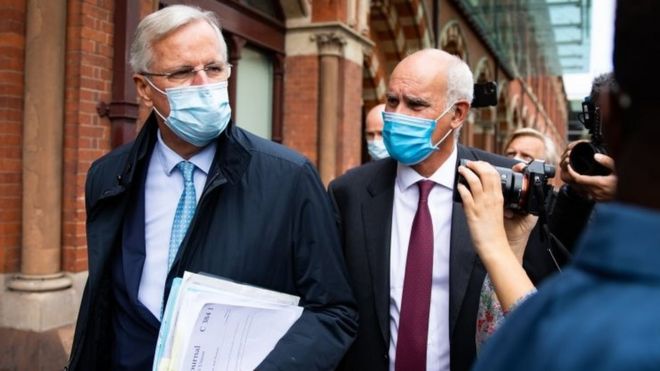 PA MEDIA
PA MEDIAThe government will later publish plans which could override key elements of its Brexit deal with Brussels, in breach of international law.
The Internal Market Bill will set out how powers currently held by the EU will be shared out after the post-Brexit transition period ends.
But it has faced a backlash from senior Tories and prompted the resignation of a top civil servant.
It comes as the talks over a trade deal with the EU continue in London.
The Internal Market Bill could override parts of the Withdrawal Agreement that secured the UK's exit from the EU in January.
- Minister: New bill will 'break international law'
- Ministers unveil post-Brexit powers for UK nations
- Fresh row over devolved powers after Brexit
- What do I need to know about Brexit now?
Ministers say it is needed to prevent "damaging" tariffs on goods travelling from the rest of the UK to Northern Ireland if negotiations with the EU on a free trade agreement fail.
'Moral high ground'
But senior Conservatives have warned it risks undermining the UK's reputation as an upholder of international law.
Tobias Ellwood, chairman of the Commons Defence Committee, said the UK would "lose the moral high ground" if the government went through with the changes.
Tom Tugendhat, chairman of the Commons Foreign Affairs Committee said: "Our entire economy is based on the perception that people have of the UK's adherence to the rule of law."
Health Secretary Matt Hancock insisted the changes were necessary to protect the Northern Ireland peace process if the UK failed to get a free trade deal with the EU.
"The decision we've made is to put the peace process first, first and foremost as our absolute top international obligation," he told BBC Radio 4's Today programme.
A former Cabinet minister, involved in putting together the Withdrawal Agreement, reacted furiously to Mr Hancock's claim.
The former minister, who did not want to be named, told the BBC: "I cannot allow anyone to get away with saying the government is doing this to protect the peace process. This does the precise opposite.
"It is about the internal market in the UK and is more likely to lead to a hard border [between Northern Ireland and the Republic of Ireland] which will imperil the peace process."
'Specific and limited'
The permanent secretary to the Government Legal Department, Sir Jonathan Jones, has resigned from his role over concerns about the government breaching its obligations under international law.
In the Commons on Tuesday, Northern Ireland Secretary Brandon Lewis admitted the bill would break international law in a "very specific and limited way".
It would allow the UK government to "dis-apply" the EU legal concept of "direct effect" - which gives EU law supremacy over UK law in areas covered by the Withdrawal Agreement - in "certain, very tightly defined circumstances," he told MPs.
The Scottish government, meanwhile, has said it will not consent to a change in the law along these lines, arguing that it would undermines devolution.
The bill has also been attacked by the Welsh Brexit minister, Labour's Jeremy Miles, who accused the government of "stealing powers from devolved administrations".
"This bill is an attack on democracy and an affront to the people of Wales, Scotland and Northern Ireland," he added.
Cross border trade
The legislation will see Scotland, Wales and Northern Ireland handed powers in areas such as air quality and building efficiency currently regulated at EU level.
It will also set up a new body - the Office for the Internal Market - to make sure standards adopted in different parts of the UK do not undermine cross-border trade.
The new body will be able to issue non-binding recommendations to the UK Parliament and devolved administrations when clashes emerge.
However, plans to hand UK ministers extra powers to ensure the application of customs and trade rules in Northern Ireland have prompted a row over the UK's legal obligations in its exit deal.
'Old arguments'
Under the UK's withdrawal agreement, Northern Ireland is due to stay part of the EU's single market for goods in a bid to avoid creating a hard border with the Irish Republic.
In parallel with talks over a post-Brexit trade deal, the UK and EU are negotiating the precise nature of new customs checks that will be required.
Labour leader Sir Keir Starmer has accused Downing Street of "reopening old arguments that had been settled" and said the government should instead focus on securing a deal with the EU.
Former Conservative PM Theresa May warned the legislation could damage "trust" in the UK over future trade deals with other states.
Irish Foreign Affairs Minister, Simon Coveney, called Mr Lewis's comments "gravely concerning".
And French MEP Nathalie Loiseau said: "The prime minister has promised to put a tiger in the tank in the negotiations. It seems for the time being he is putting an elephant in the china shop."
No comments:
Post a Comment